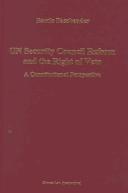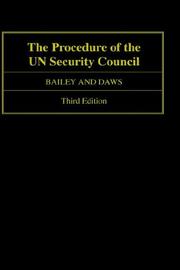| Listing 1 - 10 of 87 | << page >> |
Sort by
|
Book
ISBN: 2940415706 2940415048 Year: 2009 Publisher: Graduate Institute Publications
Abstract | Keywords | Export | Availability | Bookmark
 Loading...
Loading...Choose an application
- Reference Manager
- EndNote
- RefWorks (Direct export to RefWorks)
The aut dedere aut judicare, or “extradite or prosecute” clause is shorthand for a range of clauses that are almost compulsory in international treaties criminalizing conduct, obliging a State to either extradite or prosecute one accused of the crime the subject of the treaty. The obligation has become increasingly central in the emerging legal regime against impunity and has a role in States’ armoury of international criminal enforcement mechanisms. Yet there has been little academic consideration of the sources of the principle, including whether it exists at customary international law, and the scope and operation of the obligation. While the topic is currently being considered by the International Law Commission, this paper seeks to provide some of the empirical research that has to date been missing and to identify the sources and scope of the obligation to extradite or prosecute. The views reflected in this paper are personal and do not necessarily reflect those of the United Nations.
Law, Politics & Government --- Law, General & Comparative --- terrorism --- human rights --- conflict security and peacebuilding --- United Nation Security Council --- governance
Book
ISBN: 0191811602 0192538217 Year: 2018 Publisher: Oxford : Oxford University Press,
Abstract | Keywords | Export | Availability | Bookmark
 Loading...
Loading...Choose an application
- Reference Manager
- EndNote
- RefWorks (Direct export to RefWorks)
The United Nations Secretary-General and the United Nations Security Council spend significant amounts of time on their relationship with each other. They rely on each other for such important activities as peacekeeping, international mediation, and the formulation and application of normative standards in defense of international peace and security - in other words the executive aspects of the UN's work. The UN Secretary-General and the Security Council fills an important lacuna in the scholarship on the UN system. Although there exists today an impressive body of literature on the development and significance of the Secretariat and the Security Council as separate organs, an important gap remains in our understanding of the interactions between them.
United Nations. --- Hội đồng bảo an Liên Hợp Quốc --- United Nations --- United Nation.
Book
ISBN: 1281770116 9786611770112 0191538582 9780191538582 9781281770110 6611770119 0199533431 9780199533435 9780199583300 0199583307 9780191614934 0191614939 1383044597 Year: 2008 Publisher: Oxford ; New York : Oxford University Press,
Abstract | Keywords | Export | Availability | Bookmark
 Loading...
Loading...Choose an application
- Reference Manager
- EndNote
- RefWorks (Direct export to RefWorks)
This text brings together leading scholars and practitioners to provide an analysis of the legal, historical, and political context in which the Security Council operates. They explore the different functions that the Council has acquired over the last 60 years, partly in response to the changing nature of war.
United Nations. --- Hội đồng bảo an Liên Hợp Quốc --- United Nations --- United Nation.
Book
ISBN: 9780199685295 0199685290 1322061777 0191508438 019180374X Year: 2015 Publisher: Oxford : Oxford University Press,
Abstract | Keywords | Export | Availability | Bookmark
 Loading...
Loading...Choose an application
- Reference Manager
- EndNote
- RefWorks (Direct export to RefWorks)
This text is a revised edition and contains new material documenting the extensive and rapid innovations in the UN Security Council's procedures of the past two decades. It provides insight into the inside workings of the world's pre-eminent body for the maintenance of international peace and security. Grounded in the history and politics of the Council, it describes the ways the Council has responded through its working methods to a changing world. It explains the Council's role in its wider UN Charter context and examines its relations with other UN organs and its own subsidiary bodies.
United Nations. --- 822.1 Verenigde Naties --- Hội đồng bảo an Liên Hợp Quốc --- United Nations --- United Nation.

ISBN: 9041105921 Year: 1998 Volume: 32 Publisher: The Hague Kluwer Law International
Abstract | Keywords | Export | Availability | Bookmark
 Loading...
Loading...Choose an application
- Reference Manager
- EndNote
- RefWorks (Direct export to RefWorks)
Veto. --- Veto --- United Nations. --- Hội đồng bảo an Liên Hợp Quốc --- Constitutional law --- Executive power --- United Nations --- United Nation.
Periodical
ISSN: 24121347 Year: 2010 Publisher: New York United Nations
Abstract | Keywords | Export | Availability | Bookmark
 Loading...
Loading...Choose an application
- Reference Manager
- EndNote
- RefWorks (Direct export to RefWorks)
The Index to Proceedings is a powerful tool which provides a window into the annual meetings of the main UN organs. The publication is comprised of a subject index to all the documents issued by the body in question during a particular session/year and an index to speeches delivered before the forum in question during a particular session/year.
Veiligheidsraad. --- United Nations. --- Nations Unies. --- Proceedings --- Hội đồng bảo an Liên Hợp Quốc --- United Nations --- United Nation.

Abstract | Keywords | Export | Availability | Bookmark
 Loading...
Loading...Choose an application
- Reference Manager
- EndNote
- RefWorks (Direct export to RefWorks)
United Nations. --- United Nations law --- United Nations. Security Council --- Hội đồng bảo an Liên Hợp Quốc --- United Nations --- United Nation.
Book
ISBN: 2940600198 Year: 2020 Publisher: Genève : Graduate Institute Publications,
Abstract | Keywords | Export | Availability | Bookmark
 Loading...
Loading...Choose an application
- Reference Manager
- EndNote
- RefWorks (Direct export to RefWorks)
This paper looks at the contentious debate surrounding humanitarian intervention through a critical, narratological lens. By questioning the roles cast and identities constituted, in what could be compared to a theatrical drama, focus is given to the unreliable narration of the most powerful characters on the international stage – from the US to the UN – and its impact on the political and legal stances taken in various contexts. On a meta-level, it examines the conditions that enable this unreliable narration, by pointing out a problematic flexibility owing to the paradoxes and conflation entrenched in human rights rhetoric; what some call a budding ‘humanity’s law’. Attention is meant to be drawn to the power of mental imagery conjured up by intervention narratives, based on the story of saving innocents, as embodiments of humanity. The goal is to foster self-reflection among readers working in humanitarian intervention, within the epistemic community of international lawyers, and beyond. We extend our heartfelt thanks to the Vahabzadeh Foundation for financially supporting the publication of best works by young researchers of the Graduate Institute, giving a priority to those who have been awarded academic prizes for their master’s dissertations.
Law (General) --- human rights --- United Nation Security Council --- governance --- international security agenda --- conflict security and peacebuilding --- security --- international law --- World war II --- International Court of Justice
Book
ISBN: 1417547960 9781417547968 Year: 2003 Publisher: [Place of publication not identified] United Nations Institute for Disarmament Research
Abstract | Keywords | Export | Availability | Bookmark
 Loading...
Loading...Choose an application
- Reference Manager
- EndNote
- RefWorks (Direct export to RefWorks)
Law, Politics & Government --- International Relations --- United Nations. --- Hội đồng bảo an Liên Hợp Quốc --- United Nation. --- United Nations
Book
ISBN: 1139948903 1139949950 1139027751 0521518415 0521740061 Year: 2014 Publisher: Cambridge : Cambridge University Press,
Abstract | Keywords | Export | Availability | Bookmark
 Loading...
Loading...Choose an application
- Reference Manager
- EndNote
- RefWorks (Direct export to RefWorks)
Trades of money for political influence persist at every level of government. Not surprisingly, governments themselves trade money for political support on the international stage. Strange, however, is the tale of this book. For, in this study, legitimacy stands as the central political commodity at stake. The book investigates the ways governments trade money for favors at the United Nations Security Council - the body endowed with the international legal authority to legitimize the use of armed force to maintain or restore peace. With a wealth of quantitative data, the book shows that powerful countries, such as the United States, Japan, and Germany, extend financial favors to the elected members of the Security Council through direct foreign aid and through international organizations, such as the International Monetary Fund and the World Bank. In return, developing countries serving on the Security Council must deliver their political support ... or face the consequences.
United Nations. --- Hội đồng bảo an Liên Hợp Quốc --- United Nations --- Economic aspects. --- United Nation.
| Listing 1 - 10 of 87 | << page >> |
Sort by
|

 Search
Search Feedback
Feedback About UniCat
About UniCat  Help
Help News
News